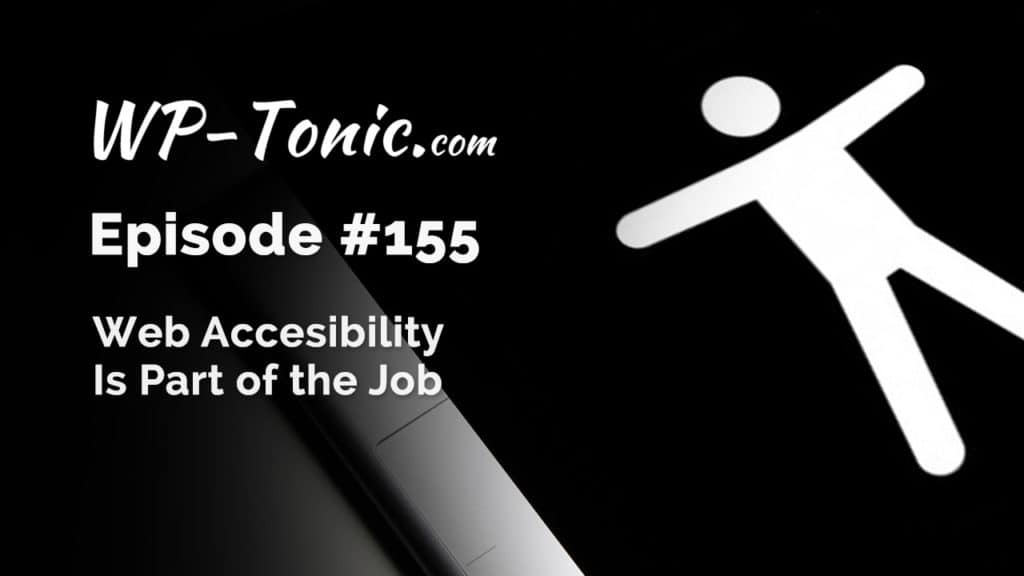In this WP-Tonic round-table, we discuss the latest WordPress news and Web Accessibility. Accessibility is one of those things that is often neglected or misunderstood in web development. But making sure your website is accessible has benefits even for your regular customers.
We ask the panel what tools do they use to test a site for accessibility? Also, how do they bake accessibility testing into the development cycle? What are the key factors that developers must know about web accessibility in 2017?
We also discuss the various types of disabilities and impairments that your website should be accessible towards. Finally, we look at a long list of tools and resources for learning more about a11y accessibility, 508 compliance, and tools for testing web accessibility.
This is one of our most important episodes to date, and a topic that all designers and developers should research.
This Weeks WordPress News Stories
1 – Renewing Medium’s focus?
2 – W3Techs Ranks WordPress as the Fastest Growing CMS of 2016
https://wptavern.com/w3techs-ranks-wordpress-as-the-fastest-growing-cms-of-2016
3 – Matt Mullenweg Announces Tech and Design Leads for New Focus-Based Development Cycle
The WordPress Panel for Episode 155
Jackie D’Elia: from Jackie D’Elia Design
Lee Jackson: from LeeJacksonDev.com
John Locke: from Lockedown SEO
Jonathan Denwood: from WP-Tonic.com
Things You Might Not Know About Accessibility and the Population
Color blindness affects 8% of all men, and 0.5% of all women around the world. If you do not test your website for color contrast, you are potentially creating a bad user experience for 4.5% of your customers.
1.3% of all Americans are legally blind. It is estimated that 10 million Americans are either legally blind or have vision impairment. This is 3.1% of all people in the United States. When your website is not readable by a screen reader, or if you use the low contrast typography that is currently popular, this is potentially alienating another 3.1% of your customer base.
Some people have motor function impairments. It is difficult for them to use a mouse to navigate your site. They may use the Tab key, or other assistive technology. Make sure that someone can go through your entire site and complete all necessary tasks using only the Tab key on the keyboard. It is also a good idea to make your tap or click targets easy to hit.
Over 5% of the world population is deaf or has hearing loss. According to the 2014 US Census, the population of each state is roughly between 2% and 4% deaf or hearing impaired. Videos or audio tracks ideally should have written transcripts. YouTube has made it easier for people to provide written transcriptions. Many podcasts are also starting to use sponsorship funds to provide written transcripts for the hearing impaired.
Full Transcript of Episode 155
[faq p=8729]Web Accessibility Links Mentioned During the Show
Download the PDF of links mentioned during the show on web accessibility.
Rethink.fm Episode #7: Why Web Accessibility Matters
https://rethink.fm/podcast/episode-7-why-web-accessibility-matters/
WP Accessibility plugin
https://wordpress.org/plugins/wp-accessibility/
AChecker
https://achecker.ca/checker/index.php
Browse Aloud
https://www.texthelp.com/en-gb/products/browsealoud
A11y Project
https://a11yproject.com/resources.html
Accessible Ready Themes on WordPress.org
https://en-gb.wordpress.org/themes/tags/accessibility-ready/
W3C Validator
https://validator.w3.org/
WAVE Web Accessibility Evaluation Tool
wA11y – The Web Accessibility Toolbox
https://wordpress.org/plugins/wa11y/
Colorblind Web Page Filter
https://www.color-blindness.com/2006/04/10/colorblind-web-page-filter/
ARIA Roles
https://www.w3.org/TR/wai-aria/roles
A11y Toolbar
https://github.com/downzer0/a11y-toolbar
Using JAWS to Evaluate Web Accessibility
https://webaim.org/articles/jaws/
Varvy
SUBSCRIBE ON ITUNES




